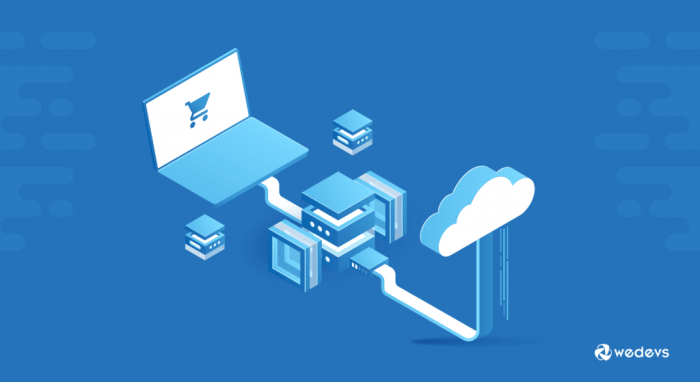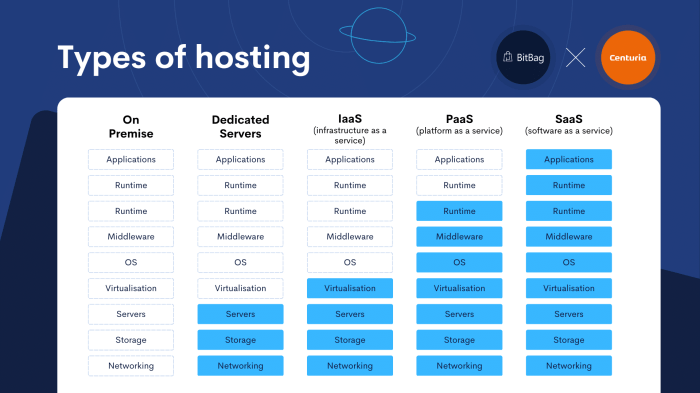Choosing the right cloud hosting for e-commerce websites is crucial for success. E-commerce platforms require robust infrastructure to handle fluctuating traffic, secure sensitive data, and ensure seamless customer experiences. Unlike traditional websites, online stores demand specialized features like payment gateways, inventory management, and shopping cart integration, all of which heavily rely on the underlying hosting solution.
This comprehensive guide delves into the complexities of cloud hosting for e-commerce, exploring different types, key features, and best practices to help you make informed decisions.
Understanding the unique demands of e-commerce websites is the first step. Scalability, security, speed, and uptime are paramount for online stores. Scalability allows businesses to adapt to traffic surges during peak seasons or promotional campaigns, while security protects sensitive customer data and payment information.
Speed is essential for a positive user experience, ensuring quick page load times and seamless transactions. Uptime guarantees website availability, minimizing downtime and potential revenue loss. These factors influence hosting choices, with businesses needing to select solutions that cater to their specific needs and growth plans.
Types of Cloud Hosting for E-commerce: Choosing The Right Cloud Hosting For E-commerce Websites
Choosing the right cloud hosting solution for your e-commerce website is crucial for its performance, scalability, and security. Understanding the different types of cloud hosting available is the first step towards making an informed decision.
Cloud Hosting Options
Here’s a breakdown of the most common cloud hosting options for e-commerce, along with their pros and cons:
| Hosting Type | Resources | Control | Cost |
|---|---|---|---|
| Shared Hosting | Shared resources with other websites on the same server. | Limited control over server settings and configurations. | Most affordable option, typically starting at a few dollars per month. |
| VPS Hosting | Virtualized server with dedicated resources, offering more power and control than shared hosting. | More control over server settings and configurations, but still limited compared to dedicated servers. | More expensive than shared hosting, but still relatively affordable. |
| Dedicated Hosting | An entire physical server dedicated solely to your website. | Complete control over server settings and configurations. | Most expensive option, but provides the highest performance and security. |
| Cloud-Based Hosting | Distributed network of servers, offering scalability, flexibility, and high availability. | High level of control over resources and configurations, with options for managed services. | Pricing varies based on resource usage and service level, but can be more cost-effective in the long run. |
Key Features to Consider
Choosing the right cloud hosting for your e-commerce website is a crucial decision that can significantly impact your business success. The features you prioritize will directly affect your website’s performance, security, scalability, and ultimately, your ability to attract and retain customers.
Scalability
Scalability refers to a cloud hosting service’s ability to adapt to changes in traffic and resource demands. For e-commerce websites, scalability is essential for handling peak traffic periods like holidays or promotional campaigns.
- A scalable hosting solution allows your website to handle increased traffic without experiencing slowdowns or downtime.
- This is particularly important for e-commerce websites, as even a brief outage can lead to lost sales and frustrated customers.
Security
Security is paramount for any e-commerce website, as it protects sensitive customer data like credit card information and personal details.
- Cloud hosting providers offer robust security features such as firewalls, intrusion detection systems, and regular security updates.
- These features help prevent unauthorized access to your website and data, minimizing the risk of data breaches and financial losses.
Performance
Website performance is a crucial factor for user experience and conversion rates.
- A slow-loading website can lead to frustrated customers who abandon their shopping carts, resulting in lost sales.
- Cloud hosting provides fast loading speeds and reliable performance, ensuring a smooth and enjoyable shopping experience for your customers.
Support
Reliable customer support is crucial for e-commerce websites, as you need assistance to address technical issues or troubleshoot problems quickly.
- Cloud hosting providers offer various support options, including 24/7 live chat, email, and phone support.
- This ensures that you have access to expert assistance whenever you need it, minimizing downtime and ensuring a smooth operation of your online store.
| Feature | Impact on E-commerce | Recommended Hosting Type |
|---|---|---|
| Scalability | Handles traffic spikes, avoids downtime during peak seasons | Cloud hosting, VPS hosting |
| Security | Protects customer data, prevents breaches, builds trust | Cloud hosting, dedicated servers |
| Performance | Fast loading speeds, smooth user experience, higher conversion rates | Cloud hosting, VPS hosting |
| Support | Quick resolution of technical issues, minimized downtime, improved customer satisfaction | Managed cloud hosting, dedicated servers |
Choosing the Right Cloud Provider

Now that you understand the types of cloud hosting and key features to consider, let’s delve into choosing the right cloud provider for your e-commerce website. Several leading providers offer a range of services, each with its strengths and weaknesses.
Understanding their offerings, pricing models, and features tailored to e-commerce needs is crucial for making an informed decision.
Leading Cloud Hosting Providers for E-commerce
Three major cloud providers dominate the market: Amazon Web Services (AWS), Google Cloud Platform (GCP), and Microsoft Azure. Each provider offers a comprehensive suite of services designed to meet the diverse needs of businesses, including e-commerce.
Comparing Cloud Provider Offerings, Choosing the right cloud hosting for e-commerce websites
Comparing the offerings, pricing models, and key features of these providers is essential to determine the best fit for your e-commerce website.
| Provider | Pricing Model | Key Features for E-commerce |
|---|---|---|
| Amazon Web Services (AWS) | Pay-as-you-go, with various pricing tiers and discounts for sustained usage. |
|
| Google Cloud Platform (GCP) | Pay-as-you-go, with flexible pricing options and discounts for committed usage. |
|
| Microsoft Azure | Pay-as-you-go, with various pricing tiers and discounts for sustained usage. |
|
Best Practices for E-commerce Cloud Hosting

Optimizing your e-commerce website’s performance on cloud hosting is crucial for success. By implementing best practices, you can ensure a smooth and enjoyable experience for your customers, leading to increased sales and brand loyalty.
Performance Optimization
Performance optimization is essential for a successful e-commerce website. A slow website can lead to lost customers and decreased sales. Here are some best practices to optimize your e-commerce website’s performance:
- Content Delivery Network (CDN):A CDN caches your website’s static content, such as images and scripts, on servers located around the world. This allows your website to load faster for users in different geographical locations.
- Optimize Images:Compress images without sacrificing quality to reduce file size and improve loading times. Tools like TinyPNG and ImageOptim can help with this process.
- Minimize HTTP Requests:Reduce the number of HTTP requests your website makes by combining CSS and JavaScript files, and using inline styles for critical elements.
- Caching:Implement caching mechanisms to store frequently accessed data in memory, reducing the need to repeatedly query databases.
- Database Optimization:Optimize your database queries and schema to improve performance. Use indexing and proper data types for faster retrieval.
- Code Optimization:Ensure your code is well-written and optimized for performance. Minimize unnecessary computations and optimize loops.
Security Measures
Security is paramount for e-commerce websites, as they handle sensitive customer data. Implementing robust security measures is crucial to protect your website and your customers.
- SSL/TLS Certificate:Use an SSL/TLS certificate to encrypt data transmitted between your website and your customers’ browsers, ensuring secure communication.
- Firewall:Implement a firewall to block unauthorized access to your website and its resources.
- Regular Security Audits:Conduct regular security audits to identify and address vulnerabilities.
- Strong Passwords:Encourage your users to use strong passwords and implement two-factor authentication for added security.
- Data Encryption:Encrypt sensitive data, such as customer credit card information, both in transit and at rest.
- Regular Updates:Keep your software and plugins up-to-date to patch vulnerabilities.
Resource Management
Managing resources effectively is crucial for ensuring your website performs optimally and efficiently. Here are some best practices:
- Auto-Scaling:Implement auto-scaling to automatically adjust resources based on traffic fluctuations. This ensures your website can handle peak traffic without performance degradation.
- Resource Monitoring:Monitor resource usage, such as CPU, memory, and storage, to identify bottlenecks and optimize resource allocation.
- Load Balancing:Distribute traffic across multiple servers to prevent overload and ensure consistent performance.
High Availability
High availability is essential for e-commerce websites, as downtime can result in lost sales and customer dissatisfaction. Here are some best practices to ensure high availability:
- Redundancy:Implement redundancy by using multiple servers and data centers. This ensures your website remains operational even if one server or data center fails.
- Disaster Recovery Plan:Develop a disaster recovery plan to Artikel procedures for restoring your website in case of a major outage.
- Regular Backups:Regularly back up your website data to ensure you can restore it in case of data loss.
Scaling Websites
Cloud hosting provides flexibility and scalability, allowing you to easily adjust resources based on traffic fluctuations. Here are some best practices for scaling your e-commerce website:
- Horizontal Scaling:Add more servers to handle increased traffic. This is a common approach for scaling out web applications.
- Vertical Scaling:Increase the resources of existing servers, such as CPU, memory, and storage. This is a good option for scaling up a single server.
- Microservices:Break down your application into smaller, independent services that can be scaled independently. This allows you to scale specific parts of your application based on demand.
- Serverless Computing:Use serverless computing platforms, such as AWS Lambda and Google Cloud Functions, to execute code without managing servers. This provides automatic scaling and pay-as-you-go pricing.
Last Point

Choosing the right cloud hosting for your e-commerce website is a strategic decision that can significantly impact your business’s success. By understanding the unique demands of online stores, evaluating different cloud hosting options, and considering key features like scalability, security, and performance, you can make informed choices that align with your specific needs.
Remember to prioritize factors like traffic volume, budget, technical expertise, and scalability when selecting a provider. By following best practices for optimization, security, and resource management, you can ensure a robust and reliable hosting environment that supports your e-commerce operations and fosters growth.